No products in the cart.
NEWS
Cultivate Prosperity: 10 Feng Shui Plants to Attract Wealth to Your Home
Bringing the tranquility and beauty of nature indoors does more than just enhance your decor; according to the principles of Feng Shui, strategic plant placement can significantly influence the energy flow in your home, inviting positive chi, promoting well-being, and specifically, attracting prosperity and wealth. Creating a green space within your home doesn’t just offer aesthetic appeal and a sense of vitality, but selecting the right Feng Shui plants can also bring financial abundance and good fortune to the household. As seasoned experts in horticulture and content creators for Biogarden.asia, we understand the deep connection between healthy plants and harmonious living spaces. Below, we share a curated list of 10 specific plants renowned in Feng Shui for their potential to bring wealth, prosperity, and rich blessings.
Understanding Feng Shui Plants
In the realm of Feng Shui, plants are much more than simple potted greenery. They are living entities believed to carry specific energies that interact with their environment. According to ancient traditions, these particular plants symbolize financial luck, ward off negative influences, and promote overall abundance. They are often favored because they are typically shade-tolerant, don’t require direct sunlight, and are conveniently sized for indoor decoration, fitting perfectly into various spaces within a home.
The Power of Incorporating Feng Shui Plants Indoors
Integrating Feng Shui plants into your indoor environment offers a multitude of benefits:
- Enhanced Aesthetics: Most Feng Shui plants boast beautiful, unique shapes and captivating colors. Planted in diverse decorative pots, they elevate the elegance and sophistication of your living spaces, significantly boosting aesthetic appeal.
- Promoting Well-being: Scientific studies suggest that being surrounded by plants and living in green spaces helps reduce stress, promotes mental relaxation, and provides a sense of calm after a demanding day. The presence of nature is inherently therapeutic.
- Attracting Auspicious Energy: Choosing plants that align with Feng Shui principles and placing them correctly within your home is believed to attract ‘Tài Lộc’ (wealth and fortune), bringing good luck and prosperity to the residents.
Key Considerations for Choosing and Placing Feng Shui Plants
Feng Shui plants are meant to bring luck and wealth, but their effectiveness depends on many factors, especially their selection and placement.
Regarding the Plant’s Form
- Firstly, it’s generally advised not to choose plants with overly small leaves, long trailing branches that grow wildly, or branches with many sharp thorns. These forms are sometimes associated with negative energy (“khí xấu”) that could potentially lead to disharmony, affect health, or disrupt life balance.
- Secondly, it’s preferable to select plants with a round, full, or upright shape. Plants with broad leaves or vibrant colors are believed to bring good fortune and happiness.
Regarding Plant Placement
- The position where you place a Feng Shui plant is extremely important and not universal. You might place them on desks, in the living room, at the base of staircases, etc.
- Crucially, the placement must be suitable for the plant’s growth needs and align with the resident’s personal energy (“vận mệnh”) according to Feng Shui to ensure the plant thrives and maximizes its positive impact.
Essential Tips for Nurturing Your Auspicious Plants
Many households choose to grow Feng Shui plants indoors, but incorrect practices can inadvertently bring bad luck. Here are some important considerations when planting Feng Shui plants at home:
- Consider placing Feng Shui plants near east-facing windows. This direction welcomes beneficial sunlight and is also associated with bringing positive Feng Shui energy into the home.
- Avoid planting too many Feng Shui plants indoors, as this can negatively impact indoor air quality and potentially affect family health. A moderate number is sufficient to enhance luck and beautify the home.
- Learn proper plant care techniques to prevent wilting or death due to lack of water or other issues. Allowing Feng Shui plants to die is generally considered inauspicious.
- Regarding plant location, placing them in corners of hallways, dining rooms, or living rooms is often recommended. This not only avoids obstruction but also contributes to the overall balance and harmony of the space.
- Be aware that some Feng Shui plants can be harmful, especially to children. Avoid planting known toxic species like Oleander, Primrose, or Poinsettia if they are easily accessible.
- Avoid planting trees with overly dense foliage directly in front of the main entrance, as this can obstruct views, make the entrance dark, feel suffocating, and block the flow of positive energy (chi) into the house.
- Avoid planting types with long, sharp-tipped foliage if their Feng Shui meaning is not considered positive.
- Certain plants, like the Mandevilla vine (Cát Đằng) or Chinese Sacred Lily (Hồ Quyết), are sometimes advised against for indoor planting as they can be associated with excessive Yin energy.
Top 10 Feng Shui Plants Believed to Attract Wealth and Prosperity
Here are 10 types of Feng Shui plants that not only help purify the air and offer high aesthetic value but are also thought to significantly support homeowners in achieving wealth and prosperity.
#1 Osmanthus (Cây Mộc hương)
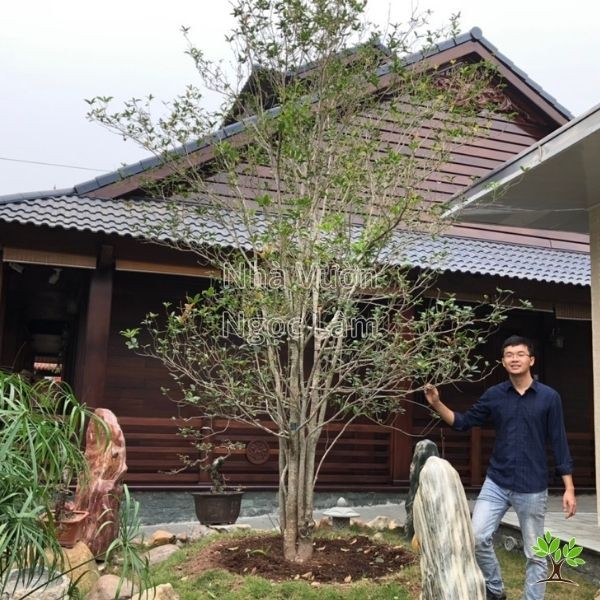 Osmanthus tree with fragrant white flowers
Osmanthus tree with fragrant white flowers
General Description: Osmanthus bears a simple, timeless beauty and a very pleasant fragrance, making it a favorite Feng Shui plant for many. Originally native to Asia, Osmanthus is cultivated in various regions. The flower color varies, including yellow, deep yellow, and white. Osmanthus flowers grow in clusters, typically having four symmetrical petals. The scent is strong and captivating, enchanting many who encounter it.
Feng Shui Significance: Osmanthus symbolizes diligence and perseverance. It represents individuals who are unassuming but strive to prove themselves, quietly attracting attention through their substance. Though not outwardly flashy, Osmanthus’s simplicity and charm create a unique, unmistakable beauty. White Osmanthus, in particular, embodies purity and elegance, reminding us of the value of humility while maintaining grace. Furthermore, Osmanthus is considered effective in warding off negative influences, leading to its widespread planting near temples and shrines. Osmanthus can be shaped into bonsai, and its considerable lifespan makes it a lasting symbol of enduring wealth, often chosen for homes, villas, or gardens to attract prosperity.
#2 Pomegranate (Cây Lựu)
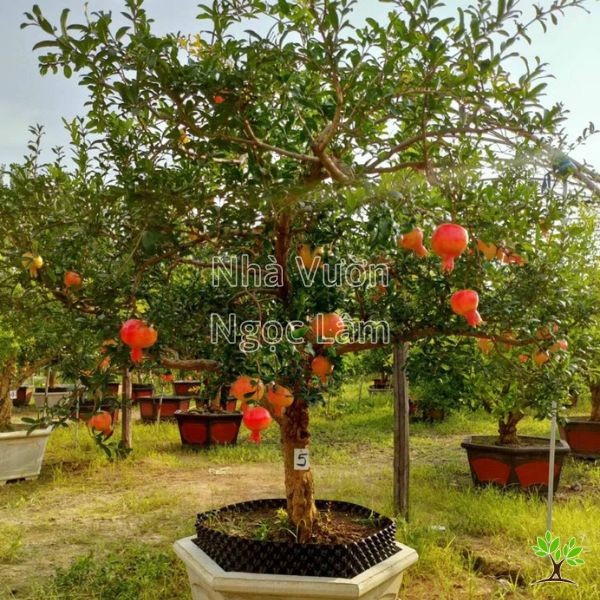 Mature Pomegranate tree laden with fruit
Mature Pomegranate tree laden with fruit
Among the top 10 Feng Shui plants for wealth, the Pomegranate tree stands out. An old saying goes, “Plant Pomegranate in the East for gold, plant Persimmon in the West for silver.” This highlights the Pomegranate’s high regard; planting it (especially in the east, as per the proverb) is believed to bring wealth and prosperity.
General Description: Originating from Southwest Asia, the Pomegranate is a small, woody tree with a narrow canopy and simple, opposite leaves. The fruiting season varies by region, but in suitable climates, Pomegranates flower in the summer and bear fruit almost year-round. Ripe Pomegranates are bright red, visually appealing, and delicious. The tree is hardy and not demanding about its environment, growing vigorously. This resilience makes Pomegranate a popular choice for ornamental purposes, enhancing the aesthetic of homes.
Feng Shui Significance: As a woody tree, Pomegranate represents stability and resilience. Its red flowers are thought to ward off evil spirits and bring good luck. The fruit contains numerous seeds. Eastern cultures highly value continuation of lineage, and the abundance of seeds in the Pomegranate symbolizes positive Feng Shui meaning: having many descendants, bringing ample blessings and fortune. In horticulture circles, Pomegranate is often called a “beauty” due to its graceful appearance. Planting Pomegranate at home is believed to attract wealth, luck, and prosperity while making the house look vibrant and full of life. It’s often listed among the top plants for bringing wealth to future generations.
#3 Persimmon (Cây Hồng giòn)
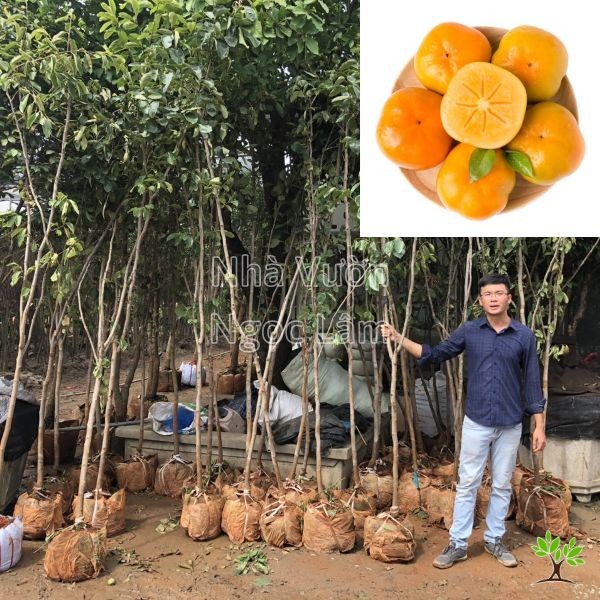 Persimmon tree with ripe orange fruit
Persimmon tree with ripe orange fruit
Persimmon is a common fruit tree in many regions and carries significant positive Feng Shui meanings.
General Description: Persimmon is a woody tree, typically growing to about 2 meters tall. Its leaves are smooth, elongated, and alternate. The fruit is flattened with thin skin and yellowish flesh, containing very few or no seeds. Originally from China, Persimmon was later introduced to America and Europe. In some areas, popular varieties include Chinese, American, Da Lat (Vietnamese), and New Zealand types.
Feng Shui Significance: In autumn and winter, branches heavy with orange-red fruit present a beautiful and elegant sight, resembling small, brightly colored lanterns that illuminate the space and inspire hope for a bountiful harvest. Furthermore, the orange-red color of the ripe Persimmon fruit symbolizes good omens and luck. Planting a Persimmon tree in front of the house is believed to attract wealth, prosperity, peace, and good fortune to the family. This is why many people choose to plant Persimmon trees in front of their homes rather than pear, peach, or orange trees.
#4 Golden Star Apple (Cây Vú sữa hoà ng kim)
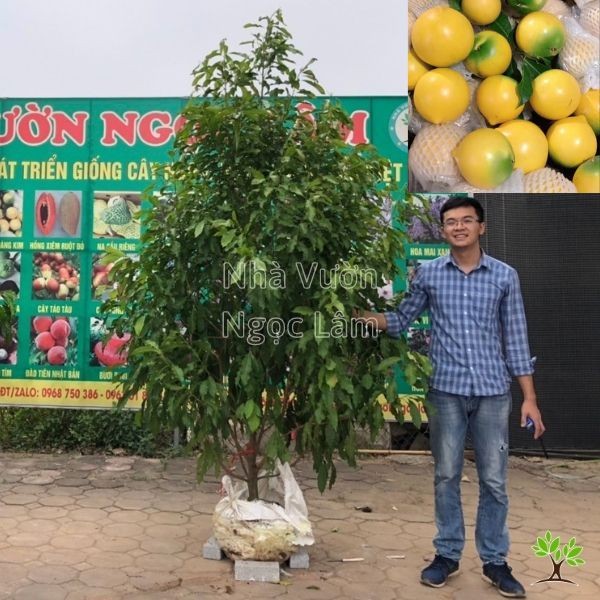 Branch of Golden Star Apple tree with yellow fruit
Branch of Golden Star Apple tree with yellow fruit
The Star Apple tree not only symbolizes sacred maternal love but also holds high economic value and contributes to urban landscaping beauty. The ‘Golden Star Apple’ variety is particularly notable.
General Description: Golden Star Apple is a woody tree originating from Taiwan. Its leaves are elongated, and the fruit develops distinctly from the foliage. The fruit has golden-yellow, thin skin and thick, fragrant flesh with a distinctive deliciousness. This variety is considered a premium fruit with a high market price. Golden Star Apple is relatively easy to grow and fruits year-round in suitable climates, making it highly compatible with tropical weather.
Feng Shui Significance: The space in front of a house is considered a place where both Yin and Yang energies converge. Planting a Star Apple tree in the front yard is believed to help absorb positive Yang energy and prevent negative Yin energy from entering the home. However, you should avoid planting Golden Star Apple directly in front of the main door or allowing its branches and leaves to become excessively dense, as this can block airflow and negatively impact the family’s Feng Shui. Star Apple, in general, and Golden Star Apple, in particular, represent sacred maternal love. Planting it serves as a reminder of the beautiful affection a mother has for her child. Furthermore, planting this tree in front of the house expresses the wish for strong and enduring family bonds. The golden color of the Golden Star Apple also symbolizes luck, wealth, and prosperity.
#5 Red Maple (Cây Phong lá đỏ)
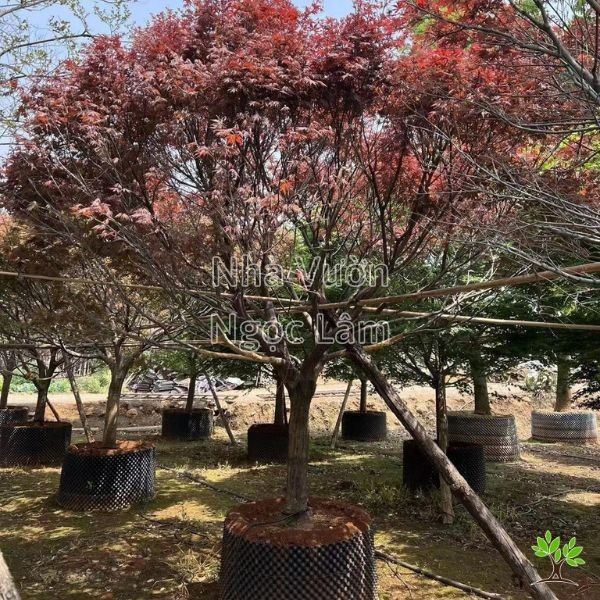 Red Maple tree with vibrant red foliage
Red Maple tree with vibrant red foliage
With its excellent adaptability and unique red hue, the Red Maple has been introduced and become a beloved ornamental tree in many places.
General Description: Red Maple belongs to the Maple genus (Acer) in the Sapindaceae family. Its origins trace back to eastern North America, Japan, Korea, and China. It is a woody tree; as it matures, the trunk becomes rough. The leaves are distinctive, typically featuring three small serrated lobes. When they first emerge, the leaves are red, gradually turning dark green as they age. The flowers are orange or red, growing in clusters and hanging downwards. The fruit grows in bunches and ripens around early June.
Feng Shui Significance: Red Maple is often considered a “protective amulet,” bringing wealth, prosperity, and health to the homeowner. It is particularly suitable for individuals with Fire or Earth elements according to Feng Shui. Planting a Red Maple is believed to bring significant good luck, enhance vital energy (“vượng khí”), and improve health. The red color of the leaves also symbolizes happiness, love, and the desire for a lifelong partnership. Additionally, placing a Red Maple bonsai on a desk is thought to dispel fatigue and negative energy, bringing positive energy and relieving work stress.
#6 Golden Trumpet Tree (Cây Phong linh và ng)
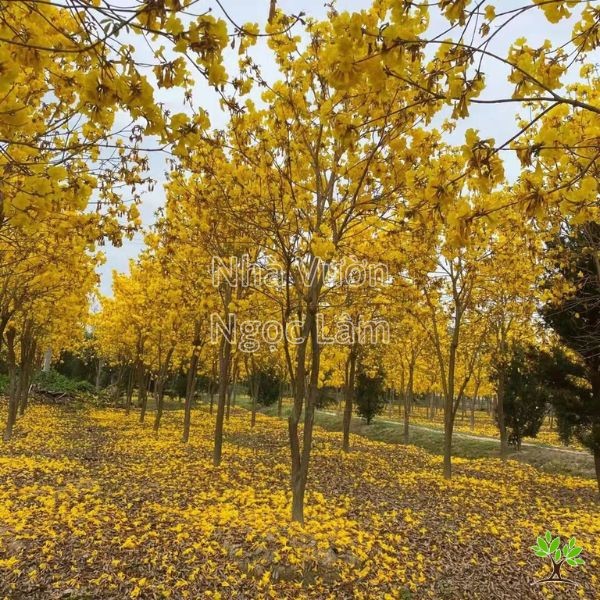 Golden Trumpet Tree blooming with bright yellow flowers
Golden Trumpet Tree blooming with bright yellow flowers
The Golden Trumpet Tree is also considered one of the top ten Feng Shui plants for attracting wealth and prosperity.
General Description: Golden Trumpet Tree belongs to the Bignoniaceae family and originates from the Amazon rainforest region in South America. This tree is a woody species. Its leaves are oval-shaped with a central vein and symmetrical branching. The most striking feature is its flowers, which bloom in the dry season after the leaves have fallen, creating a spectacular display of yellow blossoms. The Golden Trumpet Tree also possesses air-purifying capabilities, helping to create a cleaner environment. Because of these qualities, this tree is often chosen by landscape architects for urban spaces and residential areas.
Feng Shui Significance: In terms of Feng Shui, the Golden Trumpet Tree is well-suited for individuals with the Metal element. Planting this tree is believed to help mitigate bad luck and promote career advancement. The plant symbolizes wealth, fame, and prosperity, largely due to its vibrant yellow color, which represents royalty and valuable possessions. The golden flowers symbolize freshness, flourishing development, and abundance. Therefore, this tree is popular among businessmen and affluent individuals for planting in their yards. The yellow blossoms also represent luck and financial gain, while simultaneously providing positive energy and a sense of comfort when admired.
#7 Snake Plant (Cây Lưỡi hổ)
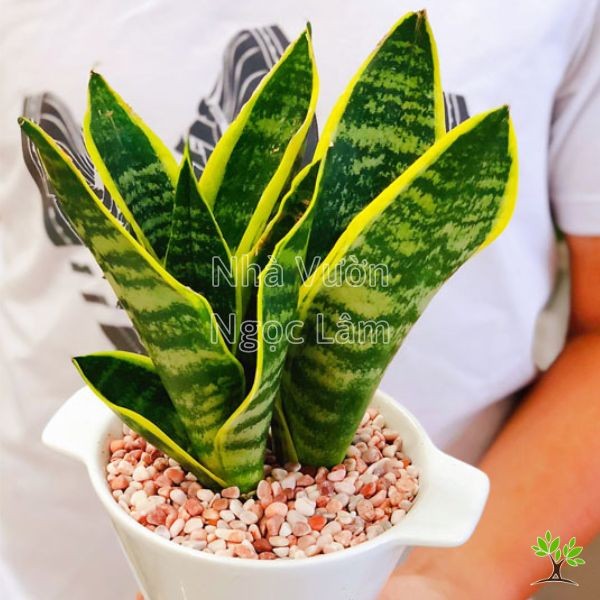 Close-up of a Snake Plant with tall, variegated leaves
Close-up of a Snake Plant with tall, variegated leaves
The Snake Plant is another variety widely recognized for its positive Feng Shui attributes, making it a popular choice for indoor planting among many homeowners.
General Description: Snake Plant, also known as Mother-in-Law’s Tongue, belongs to the Asparagaceae family and originates from Nigeria. It is a succulent plant with flat, fleshy leaves. Although the leaves appear sharp, their texture is actually quite soft and not dangerous. The upright leaves typically feature two colors, green and yellow, running vertically from base to tip. Flower clusters may emerge from the base, and the plant can produce round fruit (though this is rare indoors). There are over 70 different species, but the most common are Sansevieria trifasciata (Thai Snake Plant) and Sansevieria cylindrica (Cylindrical Snake Plant). Snake Plants are well-suited for placement in living rooms, especially next to sofas, TV cabinets, or on either side of an entryway. They can also be placed in bedrooms, where they are known to absorb toxins and improve air quality, benefiting human respiration.
Feng Shui Significance: Snake Plant is highly regarded for its strong ability to ward off evil and dispel misfortune. Its upright leaves symbolize determination, perseverance, and the will to strive upwards. The plant’s majestic appearance also conveys authority, prestige, and respect. The flowering of a Snake Plant, though uncommon, is considered highly auspicious in Feng Shui. According to traditional belief, a blooming Snake Plant brings great luck, significant wealth, and smooth progress in both career and family life. The plant’s pointed shape symbolizes the strength of a mountain lord, helping the homeowner avoid negative influences in life.
#8 Money Tree (Cây Kim ngân)
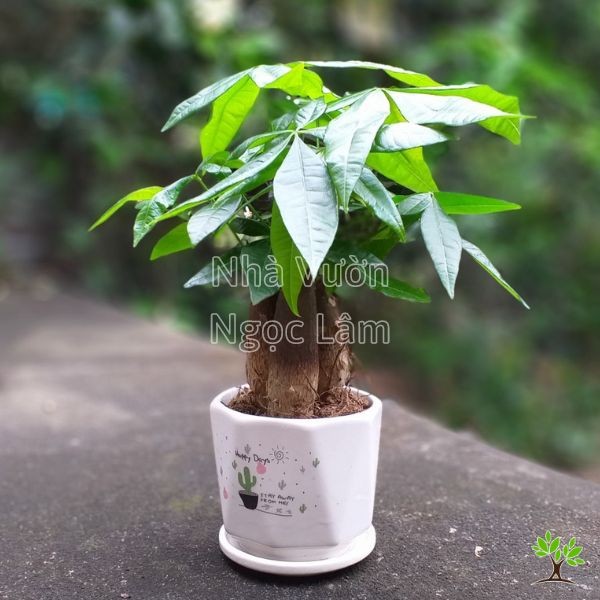 Braided Money Tree with lush green leaves
Braided Money Tree with lush green leaves
The Money Tree is consistently ranked among the top 10 Feng Shui plants believed to bring prosperity and wealth, highly favored by many homeowners for indoor cultivation.
General Description: This plant originates from Central and South America. Due to its distinctive twisted trunk, it is also sometimes called the “Braided Tree” or “Hair Braid Tree.” The canopy is wide and lush, staying green year-round. The flowers are creamy white, large-petaled, bloom at night, and have a gentle fragrance. Money Tree fruit is egg-shaped, turning yellow-brown when ripe and containing about 10-20 seeds. When grown as an indoor ornamental plant, it is very rare for a Money Tree to flower.
Feng Shui Significance: The braided, sturdy, and upright trunk symbolizes unity, strength, and resilience in the face of challenges. Placing a Money Tree in areas related to finances is believed to bring luck, prosperity, and wealth to the homeowner. Money Trees are also popular for placement on desks in offices or businesses with the aim of attracting positive energy (“vượng khí”) for the company.
The number of trunks or plants in a pot also carries significant Feng Shui meaning:
- Single Trunk (Thế Trụ Thiên – “Sky Pillar”): Planting a single, large, stout trunk represents a stable and steadfast position.
- Three Plants (Thế Phúc – Lộc – Thọ – “Happiness, Prosperity, Longevity”): Planting three trees braided together signifies enduring bonds and the presence of these three blessings.
- Five Plants (Thế Phúc – Lộc – Thọ – An – Khang – “Happiness, Prosperity, Longevity, Peace, Health/Well-being”): Planting five trees braided together symbolizes the harmonious combination and coexistence of these five elements.
#9 ZZ Plant (Cây Kim tiền / Cây Phá t tài)
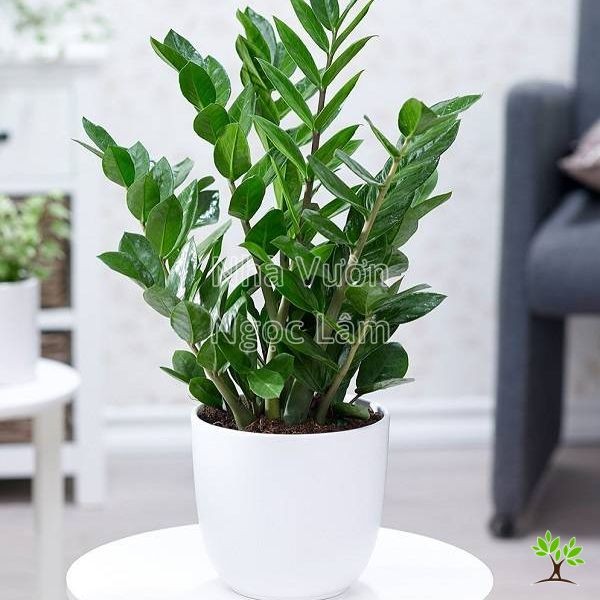 Glossy green leaves of a ZZ Plant
Glossy green leaves of a ZZ Plant
The ZZ Plant is another highly regarded Feng Shui plant you can choose for your home, believed to bring wealth and prosperity.
General Description: The ZZ Plant, also known as the Fortune Tree or Money Plant, originates from East Africa, a region with harsh climates. It is a succulent plant that grows in clumps and has a long lifespan. The trunk is short, with a swollen base. The canopy is upright and spreads outwards, creating a balanced appearance. The leaves are thick, glossy, oval-shaped, pinnately compound, and succulent. ZZ Plants grow from underground rhizomes, forming clumps as they mature. Its lush foliage remains vibrant year-round, always full of life.
Feng Shui Significance: The very name, “Kim Tiền” (meaning “Golden Money”), immediately suggests an association with wealth and prosperity. “Kim” means gold or wealth, and “Tiền” means money. Therefore, the Feng Shui meaning of this plant signifies financial gain and abundance. Planting a ZZ Plant is believed to bring career advancement, financial luck, and fortune to the homeowner. The oval leaves and upright stems, thriving even in harsh weather, symbolize strength, resilience, and the determination to succeed in life. The plant’s ability to stay green and lush year-round not only enhances the aesthetic appeal of the space but also symbolizes a continuous flow of wealth, vigorous vitality, and flourishing growth.
#10 Chinese Evergreen (Cây Phú quý)
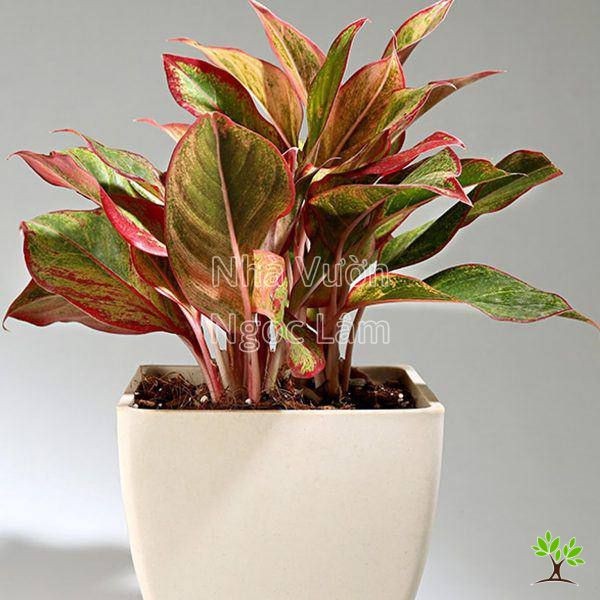 Vibrant red and green leaves of a Chinese Evergreen plant
Vibrant red and green leaves of a Chinese Evergreen plant
The final representative on our list of 10 Feng Shui plants for attracting wealth and prosperity is the Chinese Evergreen, specifically the ‘Phú Quý’ (meaning Wealthy & Noble) variety.
General Description: ‘Phú Quý’ is an Aglaonema hybrid originating from Indonesia. It is now widely cultivated in Vietnam and China. The plant has clumping roots that start white and turn green. Its striking feature is the vibrant color of its leaves, often a mix of bright red or pink margins and veins contrasting with green centers. The flowers bloom in summer, starting light yellow and turning orange or red as they fade. This plant can be grown in soil or hydroculture. ‘Phú Quý’ prefers shade and dislikes direct sunlight. However, if you wish for the plant to flower (which is significant in Feng Shui), you should ensure it receives enough indirect light.
Feng Shui Significance: Just the name “Phú Quý” carries a powerfully positive Feng Shui meaning. “Phú” means rich or wealthy, and “Quý” means noble or precious. Planting a ‘Phú Quý’ plant indoors is believed to bring wealth, prosperity, and abundance to the homeowner. The plant symbolizes good fortune and auspiciousness. The prominent red color in the leaves is thought to represent luck and positive events. The harmonious combination of red and green gives the ‘Phú Quý’ plant a noble and luxurious beauty, while also being vibrant. The flowering of this plant is considered a sign of impending financial luck, suggesting that the homeowner should be attentive to business opportunities during this time.
Sourcing Your Auspicious Plants
Feng Shui plants not only contribute to the beauty and aesthetic of a home but also hold deep symbolic meanings. Plants believed to bring wealth and prosperity are currently highly sought after by homeowners for indoor spaces or gardens.
While many places sell Feng Shui plants, finding a reputable source that guarantees quality is key. Biogarden.asia offers a selection of healthy, vibrant plants, including many of these auspicious varieties. Our plants are sourced and cared for by our experts to ensure they are ready to bring positive energy and beauty into your home.
Conclusion
Adding a carefully chosen Feng Shui plant to your living space is a meaningful way to blend natural beauty with ancient principles of energy flow. These ten plants, recognized for their associations with wealth and prosperity, offer not just aesthetic enhancement but also the potential to invite positive financial energy into your life. Whether through vibrant colors, symbolic shapes, or storied traditions, each plant presents a unique opportunity to cultivate a more abundant environment. Explore the possibilities and find the perfect green companion to enhance your home’s aesthetics and attract good fortune at Biogarden.asia.



